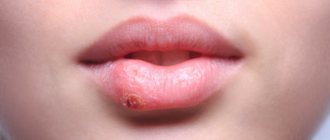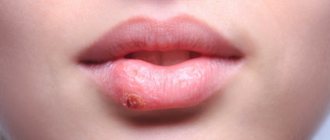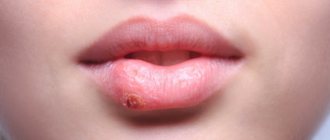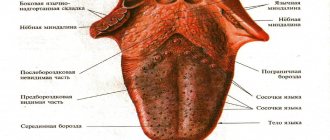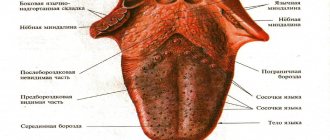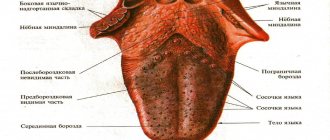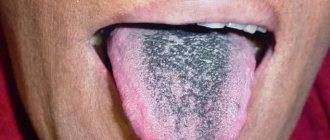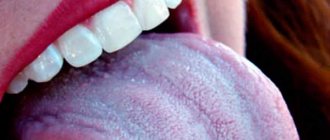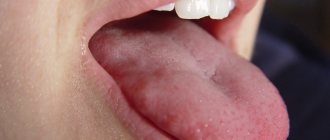When examined at a medical center, the patient is often asked to show his tongue as an indicator of health. By its appearance, a doctor of the highest category will be able to tell which organ system requires a detailed examination. Normally, the tongue is pink-red with a uniform surface and sometimes turns an unusual color - black, which can scare anyone. But today we will talk about whether such changes are always a sign of pathology, and also dwell on the causes of a rare symptom, methods of elimination, and prevention.
Should I worry?
When conducting an initial diagnosis, the doctor will pay attention to the thickness of the plaque, color intensity and other features. The most important sign of a specific pathology is the localization of layers on different parts of the tongue:
- Damage to the tip
indicates problems with the heart and blood vessels. - Coloration going deep into the organ
indicates breathing pathologies. - Spots on the central part
towards the root indicate diseases of the digestive canal. - On the sides
- about dysfunction of the spleen and liver.
The coating also varies in consistency. It can be greasy, curdled, wet or dry. In terms of area of distribution, it sometimes looks like clear spots, small inclusions, or completely covers the tongue. It is also important how the plaque is removed:
- Painless, but difficult.
- In the form of film.
- It is difficult and accompanied by severe pain.
Black deposits also appear against the background of other symptoms, such as:
- Nausea, vomiting.
- Thirst.
- Bad breath.
- Pain in different parts of the body.
- Fever.
- Yellowness, pallor or bluishness of the skin.
- Losing weight.
- Diarrhea or constipation.
- Heartburn, belching.
Such symptoms are only part of the overall picture. It will differ for a particular patient with a certain pathology. A black coating on the tongue can be a temporary phenomenon, caused by the influence of food pigments, both chemical and natural. There are many of the latter in blueberries, black currants, and mulberries. In such cases, there is definitely no reason to worry.
A similar situation develops after taking liquid iron-containing drugs or activated carbon. Slight darkening of the surface of the tongue occurs in those who like sweets with dark dyes, coffee or tea. It is not difficult to eliminate such plaque; just rinse your mouth several times or exclude the corresponding foods from your diet. It’s another matter when the nature of the symptom is related to the source of the pathological property.
Reasons for the appearance of a black dot on the tongue in an adult
A dot or black bump that appears in the tongue area cannot be ignored. This may be a symptom of a serious illness.
There are many reasons leading to darkening of the mucous membrane of the muscular organ in adults. Often the problem is provoked by infections that cause inflammation in the mouth. The spot may indicate poisoning, allergies, fungal infection, liver or pancreas dysfunction, or HIV. A doctor must make a diagnosis and prescribe treatment.
A small black dot can be seen in the absence of health problems: if you bite your tongue or eat foods that stain the mucous membrane.
Injuries
Injuries lead to the appearance of black dots in the tongue area: tissues are damaged by biting. Maxillofacial and dental surgeries can cause dark spots to appear on the mucous membrane.
Need advice from an experienced doctor?
Get a doctor's consultation online. Ask your question right now.
Ask a free question
During piercing, the puncture site often turns black.
Diseases
Among the infectious diseases that have symptoms in the form of black small and large dots on the tongue, experts include:
- sore throat and other ailments accompanied by inflammation of the oral cavity. Pathogenic microflora provokes the formation of a dense layer on the back and root of the organ - plaque. The painful condition is accompanied by dry mouth and fever. Together, the factors cause the appearance of black areas in the microbial plaque in the form of dots and specks;
- cholera A sign of the disease is multiple dark areas on the back of the tongue. The pathological process occurs against the background of high body temperature and dehydration. This provokes darkening of the plaque;
- HIV AIDS. The problem of weakened immunity leads to metabolic disorders and acid-base imbalance in the body. A black necrotic coating forms on the tongue: the epithelium covering the muscular organ in the mouth dies.
The appearance of dark spots is caused by fungal infections:
- candidiasis. The patient's tongue and cheeks are covered with a snow-white coating of a cheesy consistency. In the advanced form of the disease, spots and black spots appear on it - a consequence of chemical processes in the deposits;
- chromogenic fungus. Its reproduction is characterized by increased intensity, which leads to the production of chlorophyll. Dark spots with a green center appear on the tongue.
Black small and large dots on the organ of the mouth arise from diseases of the internal organs:
- liver dysfunction. A sign of a problem is a layer of yellowish plaque on the surface of the tongue. There is a change in the acid composition of the salivary fluid. The plaque oxidizes - large and small black dots appear;
- disruption of the pancreas;
- problems with the gastrointestinal tract lead to the appearance of a layer of yellowish plaque. Multiple foci of blackening are evidence of an advanced pathological process;
- malfunction of the adrenal glands. Due to the intense breakdown of red blood cells, acute iron deficiency develops. The consequence of the painful condition is staining of plaque on the tongue.
Among other pathologies that cause the problem in the form of multiple black dots in the mouth, there are:
- acidosis. Metabolic processes are disrupted, acid-base imbalance in the oral cavity - dark spots form on mobile muscle growths;
- Remarque's syndrome - lead poisoning. Black spots on the surface of the tongue are one of the symptoms of the disease;
- granulomatous enteritis or Crohn's disease. The muscular organ in the mouth turns black. The mucous membrane changes color completely due to the excess amount of melanin in its cells;
- radiation sickness. Pathology leads to disruption of tissue structure and death of mucosal cells. Black necrotic dots appear in the area of the root of the tongue.
Other
Other reasons can provoke the formation of points on a moving muscular organ in the mouth:
- taking a course of antibiotics, iron-containing drugs, oral contraceptives;
- dark coloring of the tongue occurs due to the consumption of activated carbon, coffee, strong tea, sweets, sweet drinks, and blueberries. Alcohol abuse and smoking also lead to the problem;
- intoxication. The appearance of black and gray dots on muscle growths in a person’s mouth is a sign of poisoning by medications or waste products of pathogenic microorganisms. In addition to the lesions, there is nausea, vomiting, dizziness, putrid breath;
- allergic reaction of the body;
- undergoing a course of chemotherapy for people suffering from cancer.
The black dot on the tongue may be a birthmark. Moles of this localization appear more often in women. They do not cause discomfort and do not require treatment.
Causes of black plaque
Factors that cause plaque in adults are associated with the following conditions:
- Acute tonsillitis (tonsillitis) and other infectious diseases.
- Long-term use of antibacterial agents, as a result of which the immune system weakens and dysbacteriosis develops.
- Slagging of the body.
- Excess weight.
- Violation of metabolic processes.
- Abuse of fatty foods and high-carbohydrate foods.
Crohn's disease is a rare autoimmune pathology. The melanin pigment is concentrated in the form of dark blue spots on the skin, tongue papillae and other mucous tissues. The condition occurs when the basic function of the adrenal glands is suppressed, and the organs of the digestive canal become inflamed. Treatment is carried out using hormonal and antibacterial agents, as well as immunosuppressants. The color of the tongue is restored as you recover. The plaque cannot be washed off by any other means.
Shades of dark color
The color of the tongue can really tell the doctor a lot about the condition of the patient's body. Dark masses on a muscular organ with various ailments have a certain shade.
- A signal about diseases of the digestive system, immunodeficiency, and hormonal imbalances is given by the dark green color of the tongue.
- Dark brown deposits occur with fungal infections, food poisoning, pulmonary diseases, as well as with hemolysis and adrenal insufficiency.
- Dark red deposits appear with scarlet fever, kidney infection, and advanced glossitis.
- With serious damage to the stomach and intestines, the plaque becomes dark gray.
- A black tint suggests cholera.
In addition, Crohn's disease is indicated by black spots on the receptor organ. Black deposits with an acetone odor indicate severe dehydration. Dark substrate and inclusions on the crowns indicate a chromogenic fungal disease. Any therapeutic program, as a rule, includes hygienic cleaning of the oral cavity. In our center it is performed by highly qualified hygienists.
How to treat black tongue
Complete elimination of a symptom depends on the source of its occurrence. This is what therapy is aimed at, including various methods, such as:
- Compliance with a special diet if the cause of plaque is gastrointestinal pathology.
- Medicines to combat inflammation, pathogenic bacteria and associated symptoms.
- Physiotherapy.
- Folk remedies.
- Surgical intervention in difficult situations when other treatment methods have proven ineffective.
Effective formulations include tinctures and decoctions for rinsing the mouth. They are based on the following medicinal plants;
- Linden;
- oregano;
- yarrow;
- chamomile;
- plantain;
- oak bark;
- mint;
- sage;
- strawberries;
- flax seeds.
Measures to be taken
Photo 2: If the color of the tumors does not lighten within several days, then it is necessary to urgently visit a doctor to rule out pathologies such as tongue cancer, glossitis and other diseases.
Source: flickr (Olalla Esquimal). To get rid of stains, it is necessary to determine the root cause of their appearance and eliminate it . A number of diseases accompanied by this symptom can be easily cured with the help of medications and vitamin complexes. Along with medications taken orally, treatment of the organ surface . This procedure is carried out using the following means:
- decoctions of sage and chamomile;
- Imudon or Lysobact tablets;
- solutions of miramistin or chlorhexidine;
- treatment in a hospital with liquid nitrogen.
If fungal infection occurs , bifidobacteria and lactobacilli and probiotics are prescribed to normalize the microflora, as well as antifungal drugs such as nystatin, livarol, fluconazole or diflucan.
Child's black tongue
If you exclude markers, paints, and food, then most often the problem with a dark tongue in a child is associated with candidiasis (thrush). The reason is simple - the baby began to be fed ahead of schedule. A black tongue in an older child may be a sign of pathologies of the gallbladder, colitis, gastritis, and enteritis. A gray coloration on the tongue appears in a child if he is treated with iron-containing compounds.
It is difficult for parents to independently understand the etiology of the problem. Only passing the necessary tests and diagnostics will help the doctor find and eliminate the cause of the symptom. At the initial stage, this specialist becomes a pediatrician, then a dentist or an infectious disease specialist joins, depending on the diagnosis.
Dangerous symptoms and which doctor to contact
When black spots on a person’s tongue do not go away within two to three days, increase in size, new spots appear, and the temperature rises, you should go to the doctor.
The first thing you need to do is visit the dentist. If this nature of the problem is excluded, then the doctor will refer the sick person to the therapist’s office. You may need help from a specialist in gastroenterology or oncology.
The main method of diagnosing the disease is bacteriological culture of plaque to determine the type of pathogenic microflora in the mouth, donating blood for analysis. If there is a suspicion of problems with the gastrointestinal tract, a coprogram and ultrasound examination of the organs will be used.
Prevention
Dark spots on the tongue will never bother you if you follow the following rules and recommendations:
- Minimize the consumption of spicy, fatty, carbonated water, coffee.
- Maintain good oral hygiene. In addition to teeth, clean the inside of your cheeks, gums, and tongue. Teach children to this. Use plant extracts for rinsing. Don't skimp on toothpaste.
- Get rid of bad habits: smoking and alcohol abuse.
- When treating with antibacterial compounds, strictly follow medical recommendations.
- Expand the amount of physical activity in accordance with age and health status.
- Add bran, fruits, and vegetables to the menu. Nutritious smoothies are beneficial. Instead of black tea, drink mint, strawberry, linden or other herbal tea.
- If you are prone to sore throat, try not to injure the mucous membrane of the throat, for which purpose eat dishes in the form of puree. Inhalation is carried out using sea buckthorn or fir oil.
- If a child’s tongue turns black, consult a pediatrician to find out what new food triggered such a symptom, so that you can then help the child adapt painlessly. Treatment methods for children do not differ from those for adults. Great care and smaller dosages will be required, as determined by your doctor.
- Baby food should be natural and consist of fresh products. On the recommendation and under the supervision of a pediatrician, vitamin and mineral complexes can be given to the child to strengthen the immune system.
Do not practice self-medication, which rarely ends well. If the condition worsens, immediately contact a doctor. Regularly visit an ENT doctor, dentist and other specialists for preventive purposes. Bitter salt for cleansing the intestines, you can find out at the link.
Diagnostics
To determine what disease led to the appearance of unpleasant symptoms, an examination is necessary. Diagnosis may include:
- General and biochemical blood test;
- Stool and urine analysis;
- Fluorography and ultrasound;
- Gastroscopy;
- Bacterial culture from the tongue;
- Coprogram;
If a dark coating appears on the tongue, adults should first consult a therapist, and young patients should be shown to a pediatrician. After examination, history taking, palpation of the abdomen and other manipulations, the patient is referred to a specific specialist. Most often, a consultation with a gastroenterologist and an infectious disease specialist is needed. Also, the patient can be referred to an endocrinologist, otolaryngologist, pulmonologist, or toxicologist. The dentist is very helpful.
What is the danger of developing growths on the tongue?
Often a person does not even suspect that HPV is present in his body, which manifests itself in the form of papillomas. If the growth is localized on the inside of the tongue, closer to the palate, then the patient may not notice the growth. And then the doctor accidentally finds the papilloma during an examination of the patient’s oral cavity.
Papillomas that are located on the tip of the tongue are less common, but they are always noticeable. Such growths interfere with talking and eating, so people with such growths most often seek help from a medical facility.
What else can you expect from a growth on the tongue, besides discomfort:
- Papilloma is a benign neoplasm that in itself does not pose a threat to human health. But in 1.2% of cases, malignancy of such processes occurs, i.e. The tumor goes from benign to malignant.
- The oral cavity is an extremely undesirable place for papillomas to be found. If in other parts of the body growths can “live” quietly, and the doctor will not recommend removing a tumor that does not pose a threat, then papillomas on the tongue are often injured. This can lead to inflammation.
Homeopathic remedies for black spots on the tongue
Many doctors, along with traditional remedies for the treatment of tumors on the tongue, also prescribe homeopathic medicines . Below we provide a list of medications that treat black spots by eliminating the main cause of the disease.
| Symptoms | Drugs |
| Fungal plaque, which has various shades from light to black. |
|
| Brown plaque, accompanied by dehydration and stomach diseases. |
|
| Brown plaque, necrosis of the pharynx and palate. |
|
| Brown and black spots in acute respiratory infections with elevated temperature and nasal congestion, the formation of cracks in the corners of the mouth, profuse snot and nasal congestion. |
|
| Brown and black spots, tongue is dry and itchy. |
|
| Dark brown plaque localized in the center of the muscle. |
|
| Black spots. |
|
| Black and black-purple spots on the root of the muscle. |
|
Tongue piercing
In some cases, pigmentation disappears in the tongue piercing area, leaving only dark-colored spots. They can occur not only due to bleeding that occurs during the puncture, but due to the presence of jewelry in the oral cavity.
If an infection occurs during the piercing, it should be treated in a timely manner. In addition, it is important to perform all necessary postoperative manipulations and use only gold or titanium jewelry, as they are the least allergenic.
